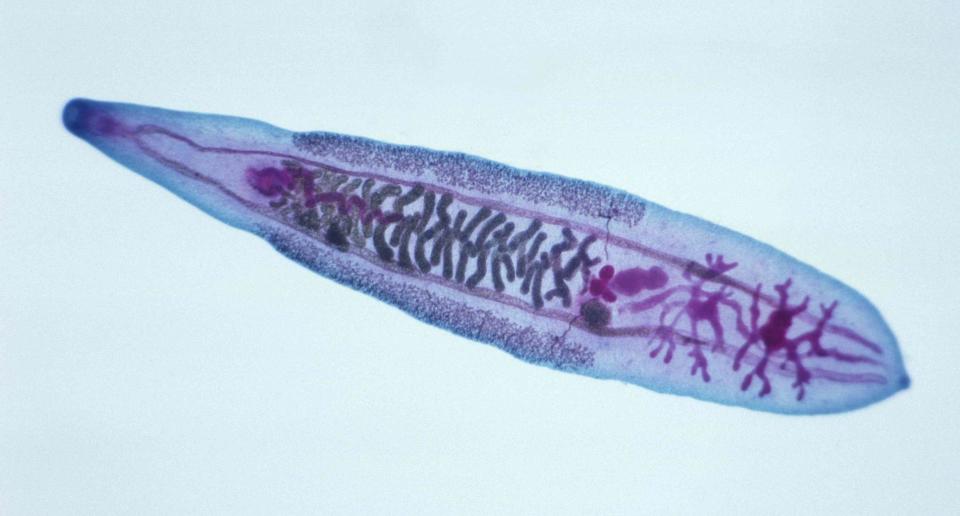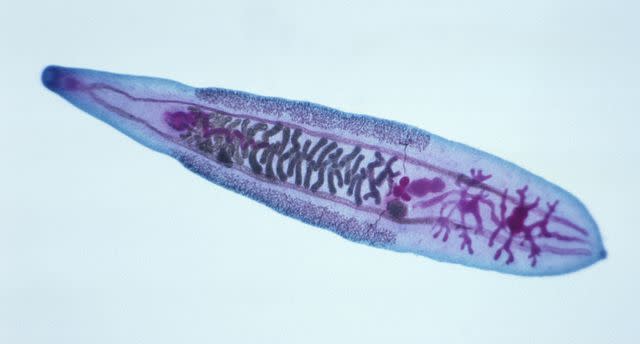What Are Liver Flukes?
Parasitic Worms That Cause Infections

Ed Reschke / Getty Images
Liver flukes are parasitic worms that cause liver, gallbladder, and bile duct infections in humans. Whether you're likely to get a liver fluke infection depends on where you live, what you eat, and if you travel to areas where these parasites are present.
People get liver flukes after eating certain raw or uncooked foods from areas throughout all continents except Antarctica. They are not common in the United States. Long-term liver fluke infections are associated with health complications, including bile duct disease.
This article will describe the types of liver flukes along with liver fluke complications and overall prognosis for liver fluke.

Ed Reschke / Getty Images
Learn More:Parasite Primer
Types
According to the Centers for Disease Control and Prevention (CDC), there are three types of liver flukes that can cause infection in humans. These types are based on geographical location. Traveling to parts of the world where these types of liver flukes are widespread will increase your likelihood of infection.
Liver fluke types:
Fasciola Species
Fasciolas are known as common liver flukes or sheep liver fluke. The Fasciola species has two subtypes, Fasciola hepatica and Fasciola gigantica, both of which are found in over 70 countries throughout the world, except for Antarctica.
These liver fluke species are particularly present in areas where there are sheep or cattle, but people can also become infected with this parasite from eating raw watercress and other water plants that have been contaminated by parasite larvae. Fasciola species cause fascioliasis infections.
Liver fluke infections are often asymptomatic, meaning there are no obvious signs and symptoms. When there are symptoms, they are typically nonspecific and can be attributed to many illnesses. They include fever, abdominal pain, and appetite loss.
Opisthorchiasis Species
This type of liver fluke is found across Asia and Europe, and particularly in Thailand, Laos, Vietnam, Germany, Italy, Belarus, Russia, Kazakhstan, and Ukraine. Opisthorchiasis liver fluke species cause an opisthorchis infection. If symptoms do occur with this type of liver fluke, they will be nonspecific and include digestive upset or indigestion, and in more severe cases, abdominal pain, diarrhea, or constipation.
Clonorchiasis Species
Clonorchiasis is a type of fluke found across Asia. It is contracted by eating undercooked or raw crabs, crayfish, and fish. Clonorchiasis liver fluke species cause clonorchis infections.
These types of infections require diagnosis and treatment to remedy infection.
Parasite testing is necessary to determine if you have a liver fluke. Several tests may be administered. These include stool sample testing, blood testing, and an internal examination by way of a colonoscopy or endoscopy and an MRI (magnetic resonance imaging).
Together, these tests can help your healthcare provider determine diagnosis and treatment. For best results, be sure to share your travel history so the tests ordered are as specific to your situation as possible.
Complications
Complications are rare, and liver fluke infections are not fatal on their own.
There are, however, rare cases in which infection can cause severe and serious health complications. For example, long-lasting or persistent liver flukes can cause chronic inflammation of the bile ducts (canals that pass through organs in your digestive system, including the pancreas and small intestine), which can lead to bile duct enlargement, tissue thickening, and bile duct dilation.
If you suspect you have been exposed to a liver fluke while traveling or after consuming water vegetables or undercooked animal products like fish, beef, or sheep, follow up with a healthcare provider for diagnosis and treatment.
Bear in mind that health complications from liver flukes can be prevented with treatment. As with all health-related matters, the earlier you seek treatment, the lower your risk of developing complications.
But without treatment, the CDC warns, liver fluke infections can persist throughout the life span of the parasite, which is roughly 25 to 30 years. During that time, risk of serious illness and severe symptoms increases.
Rare complications associated with liver flukes include:
Biliary system infections, which is an infection in the bile production system made up of your bile ducts, gallbladder, and liver
Stone formations throughout the biliary system, including gallstones (hard deposits in your gallbladder)
Cholangiocarcinoma (bile duct cancer)
Bile duct cancer is rare. Liver fluke infections do increase a person's risk of developing bile duct cancer in their lifetime, though. This risk is associated with the irritation and scarring caused by liver fluke infection.
Related:What Is Bile Duct Cancer?
Prognosis
Liver flukes are preventable and treatable. If you suspect liver fluke infection, consult with a healthcare provider. They may consult about diagnosis and treatment with the CDC.
Prognosis or overall health outcome after Fasciola infection is good, according to the CDC.
Treatment with Egaten (triclabendazole) is typically administered over the course of two separate doses. Triclabendazole is the only medication approved by the Food and Drug Administration (FDA) and promoted by the World Health Organization (WHO) and the Pan American Health Organization to treat common liver fluke infections.
Clinical studies show triclabendazole to be effective in the treatment of chronic and acute or sudden forms of fascioliasis and in both F. hepatica and F. gigantica infections.
Summary
Liver flukes are parasitic worms that infect the biliary system in humans. There are three main types but the most common is the Fasciola liver fluke. People can become infected with these types of parasites from eating contaminated food sources, including vegetables that have been grown in water where the parasite larvae live or by eating certain undercooked animal products.
Symptoms are not likely, but if they do occur they will include digestive system upset. The good news is liver flukes are both preventable and treatable. With two oral doses of medication, the common liver fluke can be stopped before causing bile duct irritation and scarring associated with health conditions like bile duct cancer. Complications are rare.

